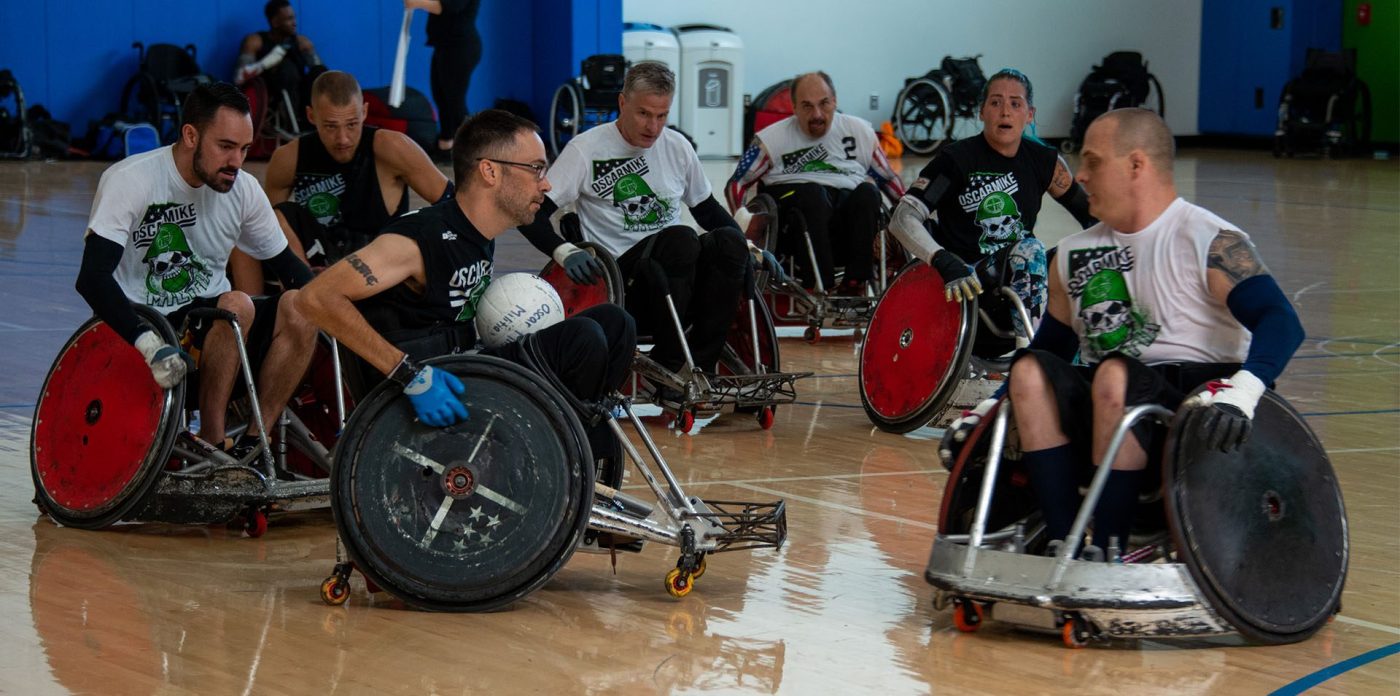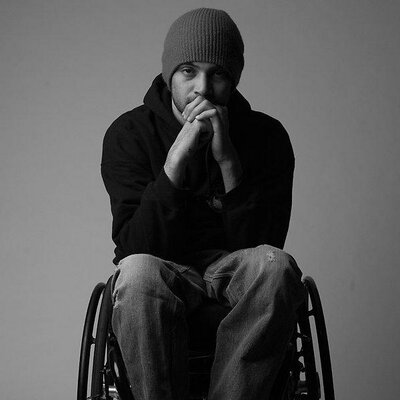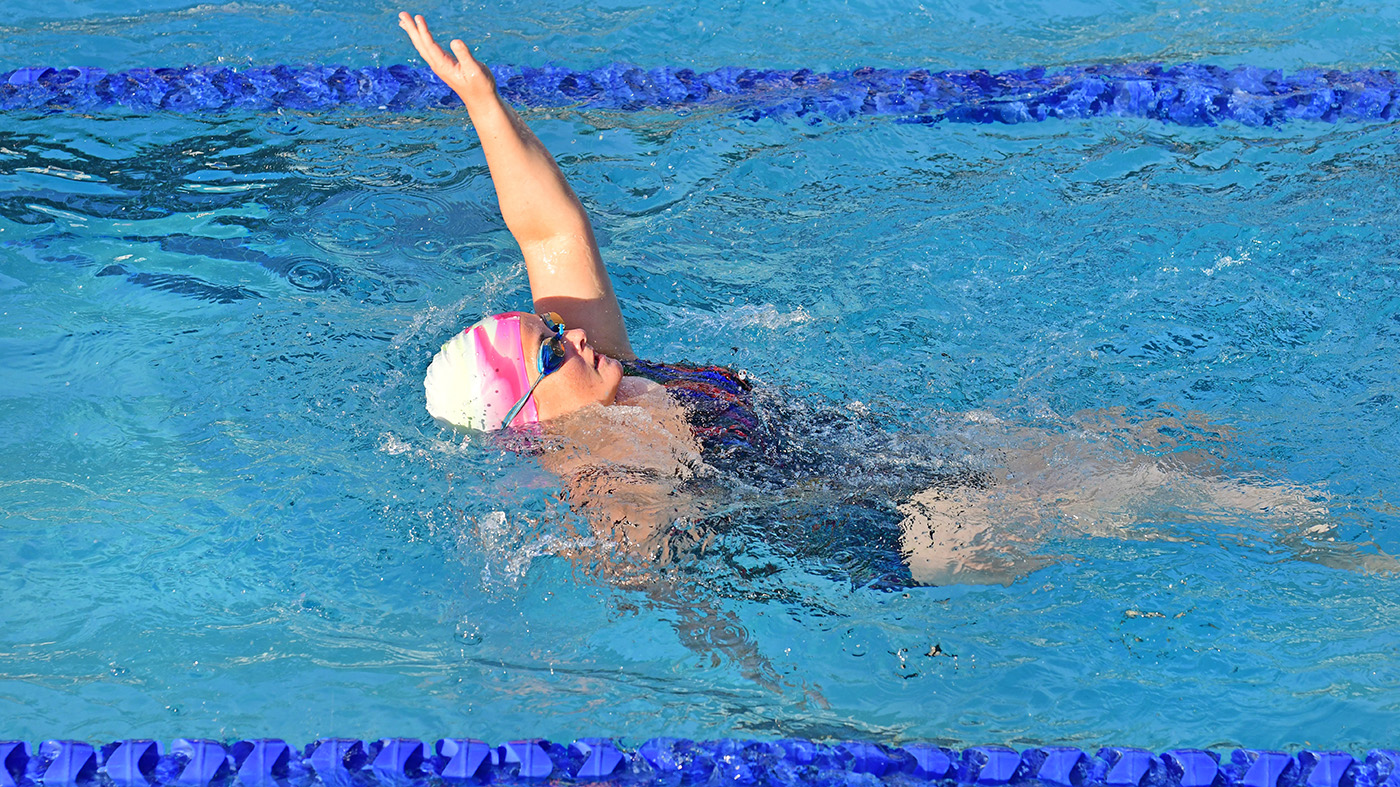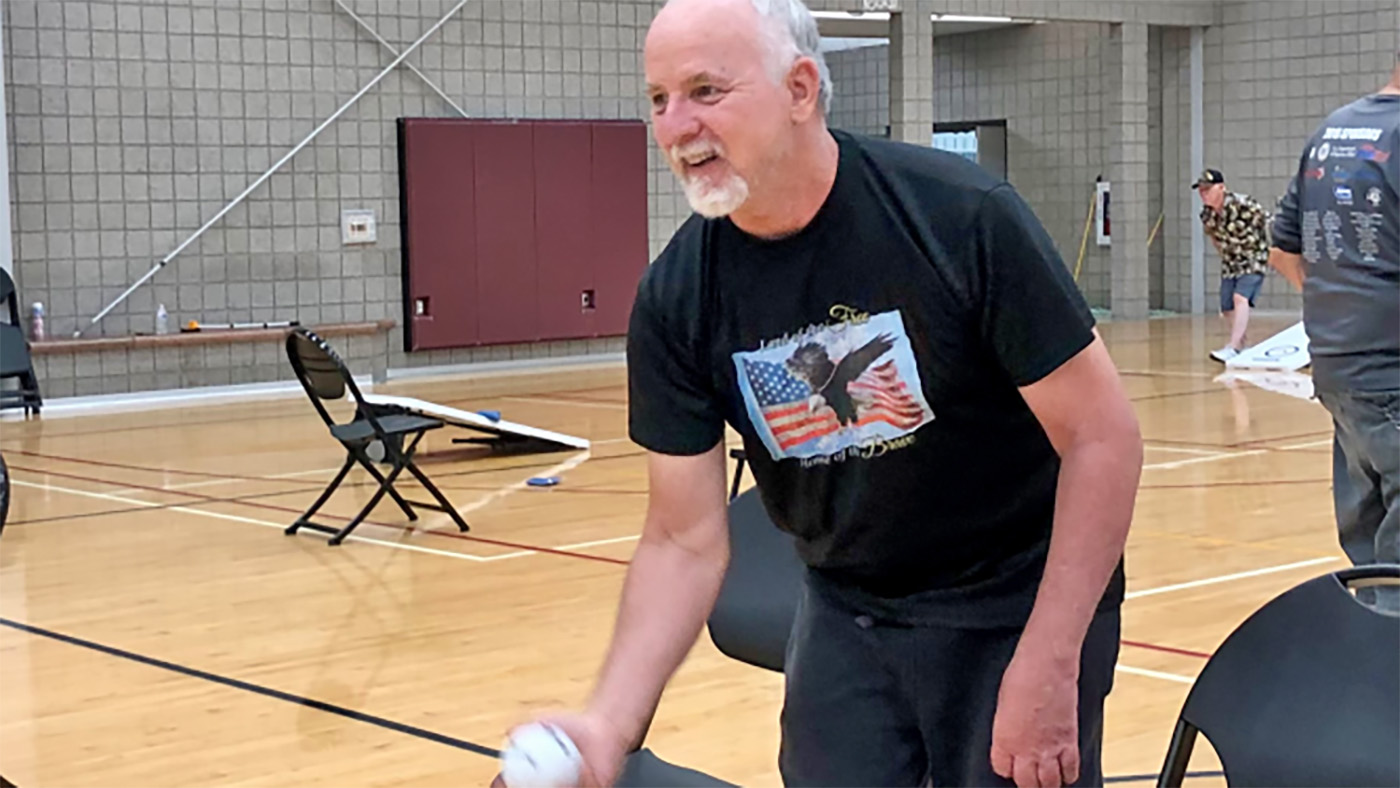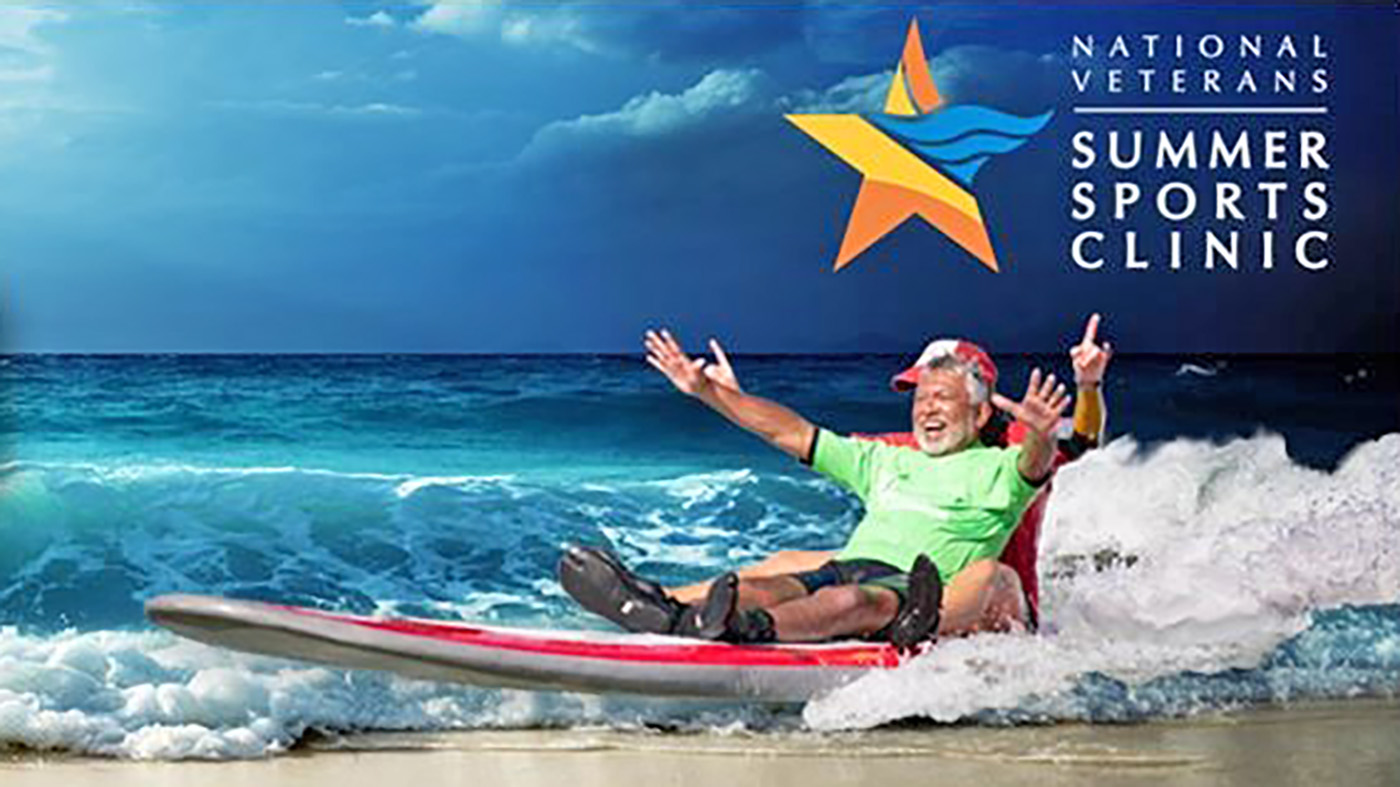Noah Currier held the tape recorder in his hand. Paralyzed mostly from the mid-chest down and unable to move without his wheelchair, his mind was spinning.
“I carry this with me in case I have an idea. I’m always thinking of new things.”
It was 2011 at the National Veterans Wheelchair Games in Pittsburgh. Currier was fired up and ready to do something–anything–he just didn’t have the idea yet.
“I don’t know,” he laughed. “I’ll let you know when I have something.”
A few hours later, in a Pittsburgh bar, he and his buddies came up with the idea and never looked back.
Currier, a 21-year-old Marine Corps Veteran who was paralyzed three days after getting home from Iraq, came up with the concept of Oscar Mike–an American-made apparel company and foundation to help people like him. Oscar Mike is military lingo for “On the Move” and was specifically chosen to represent the spirit of its founder and the Veterans he serves.
And he doesn’t take a penny in profit.
“Everything we do, every bit of money goes right back to the foundation to help other paralyzed Veterans,” he said. “We have a long way to go. We have the potential to help a couple thousand guys a year.”
In the years since starting Oscar Mike, Currier — who gets his care at the Milwaukee VA Medical Center — moved operations from his two-car garage to a 10,000-square-foot warehouse for the clothing business. The Oscar Mike Foundation has a 9,000-square-foot, lakefront home where he provides Veterans a week of recreation and education that includes kayaking and jumping out of an airplane.
Currier gives credit to VA’s adaptive sports program for making it happen. He competes every year in the National Veterans Wheelchair Games where his sports include rugby, weightlifting, slalom, 9-ball and table tennis.
That’s a long way from that day in 2003 after he returned from Iraq.
He and his buddy were driving back to base at Camp Pendleton, California, when the driver fell asleep. The truck flipped down an embankment.
“It rolled like a dozen times,” Currier said. “I remember waking up and taking my last breath. I had collapsed lungs, a broken neck, broken nose and all kinds of other broken (stuff). I took a couple breaths and asked my buddy what happened.
“I woke up a few days later in the hospital. They told me I died in the accident and they had to revive me a couple times.”
The accident broke several vertebrae and crushed his spine. Currier was paralyzed with limited use of shoulders, biceps and arms, but can’t use his fingers.
He fell into a six-year tailspin until a friend got him to go to the National Disabled Veterans Winter Sports Clinic in March 2010, where he went downhill skiing.
“That got the wind in my face and got the adrenaline going. It made me feel like a man again,” he said.
“I think when we came up with this idea for Oscar Mike, everybody was under the same understanding. The thing that propelled us in the right direction after the injury, every story we have ever heard about a serious injury, it’s the same thing — I went through this funk or this hard time and this sports thing pulled me out of it.
“If I can save one person those six years I went through, it’s why we do it.”
Dr. Ken Lee, Milwaukee VA Spinal Cord Injury Center division manager, said Currier emulates what adaptive sports is all about.
“Noah is the ultimate turnaround from the ultimate injury,” he said. “As a quadriplegic, he was really down on his life and the demons had taken over. The Games brought him new life. It teaches people they can have a life. It’s just a new way of doing things.
“He went from one end of the spectrum as the worst-case scenario, all the way to the other end of the spectrum as a phenomenal athlete, business owner and philanthropist.”
Currier made it all happen with the help of VA loans and grants, but it wasn’t easy. He had to fight government rules that made him use the lowest bidder for merchandise, meaning he’d have to use clothes made overseas.
“That went against our whole vision,” he said. “We were able to get that changed, but it took some time.”
While he waited for the grant money, he and his business partner threw in their own money.
“Once we got approved for the grants, it still took a couple years. It really hurt us in the beginning. It was horrible. We invested our own money. Me and another guy put in 20 grand a piece. Ended up losing all of it. We burned through what we had.
“But no matter what, it was still fun, and we learned a lot during that time. By the beginning of 2014, it actually started feeling like a real organization. It was less of a hobby and less of us burning through our own cash.”
They made about $60,000 the first year, $120,000 the second year, and $240,00 after that. Currier said Oscar Mike has doubled its return every year.
“Even in the beginning, the idea of a nonprofit was first, and the apparel was second,” he said. “I don’t take a penny of it. None of us have taken a dollar. It all goes to the nonprofit, and we keep each entity separate, so it isn’t an issue and we don’t get ourselves in trouble.”
But Currier knew Oscar Mike could be so much more. He wanted to take what VA taught him through the Wheelchair Games and other adaptive sports programs and offer it himself. That works with VA’s strategy to get Veterans hooked up with programs in and around their community.
He and his team had eyes on the 9,000-square-foot, lakefront home with 14 bedrooms.
“We would harass the guy who owned it and offer him a third of what he asked. He would tell us, ‘No,’ and we would say, ‘Fine.’ Then we’d come back and ask him again, and he always said, ‘No.’
“Then one day he comes back and says, ‘OK,’ and we told him, ‘We don’t have the money. We were just seeing if you’d bite,’” Currier said with a laugh. “He was an old, cranky guy and told us, ‘You’d better make this happen.’ A donor helped us out to put a deposit down and the guy selling the home kicked in $150,000 as a donation. It’s kind of a miracle how it all worked out.
“The scary moment was when we got it. We knew what we wanted to do and now we gotta make it happen. The idea was how cool it would be to affect all these people. We built it and wondered if it would be effective.”
Now, throughout the year, paralyzed Veterans spend a week at the compound at no charge and get put through the paces.
“We put them through a bunch of crazy activities,” Currier said. “First day, we teach you how to fly an airplane, go off-roading, shooting, learn about meal preparation and go over basic nutrition for healthy stuff. Second day we do weight training, throw you out of an airplane, horseback riding and kayaking. Third day we do a modified triathlon.
“We try to push independence here, so we want them to come by themselves unless it is absolutely necessary.
“We want to give them something. We want to give them back something they have been missing. Guys come out and always say the same things. They were focused on what they couldn’t do. And then adaptive sports opens a new realm of possibility of what they can do. We give them that breath of fresh air.”
For more information Currier and Oscar Mike, click here. For more information on VA’s adaptive sports, click here.
Topics in this story
More Stories
West Virginia mom builds confidence at the National Veterans Wheelchair Games.
Air Force Veteran Mark Wager overcame a stroke and is now competing in the 2024 National Veterans Golden Age Games.
Clinic offers a wide range of adaptive sports activities tailored to Veterans with physical and mental challenges.

